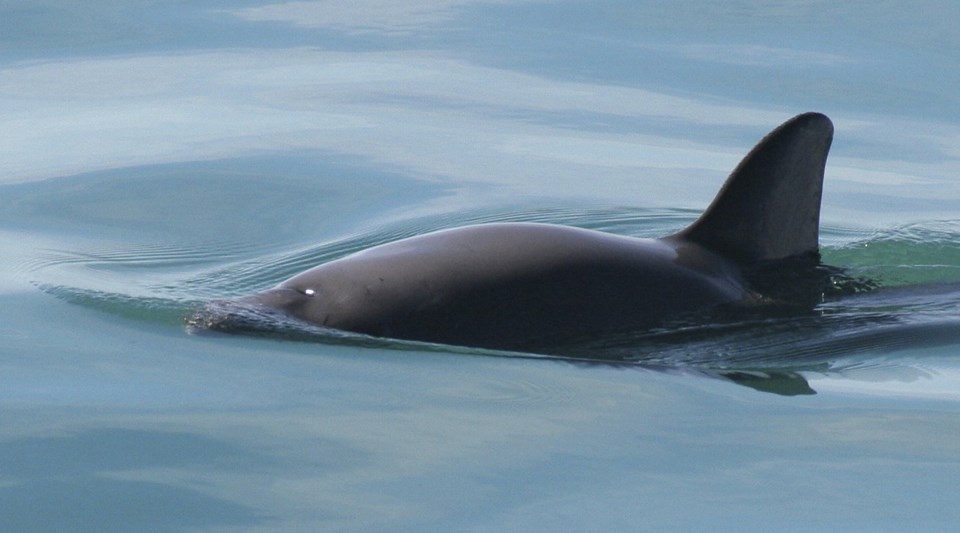MEXICO CITY (AP) ΓÇö The number of MexicoΓÇÖs vaquita marina porpoises sighted in the Gulf of California fell to between 6 and 8 this year, researchers said Tuesday.
But it is possible that some of the few remaining vaquitas ΓÇö the world's smallest porpoise and most endangered marine mammal ΓÇö may have moved elsewhere in the Gulf, the only place in the world where they live.
Last year, experts on a sighting expedition estimated they during nearly two weeks of sailing in the Gulf, also known as the Sea of Cortez.
But this year, the conservation group Sea Shepherd said a similar expedition May 5-26 sighted only about a half dozen, though the search was not as extensive as last year's. More troubling, no baby vaquitas were seen this year.
ΓÇ£Unlike 2023, no recently born calves were seen, but a healthy juvenile was seen,ΓÇ¥ Sea Shepherd said in a statement.
However, about half the sightings last year occurred outside and just west of the vaquitas' exclusive protection zone, a heavily patrolled area in the Gulf where all fishing is prohibited, though some still occurs illegally.
Experts aren't exactly sure why vaquitas might like the area just outside the protected zone, but this year's expedition concentrated on areas inside the zone.
Because they are so small and elusive, many times the vaquitas can only be seen from far away through powerful binoculars, and so such sightings are categorized as probable or likely. Thus, the numbers are expressed in probable ΓÇ£rangesΓÇ¥ of the real figure.
The animals also emit ΓÇ£clicksΓÇ¥ that can be heard through acoustic monitoring devices.
ΓÇ£While these results are worrying, the area surveyed represents only 12% of the total area where vaquitas were observed in 2015," said Dr. Barbara Taylor, the researcher who led the study. ΓÇ£Since vaquitas move freely within the vaquita refuge, we must extend the survey using acoustic detection to determine where the vaquitas are going.ΓÇ¥
There are plans to do just that. But according to the previous report, ΓÇ£fishermen have begun removing the acoustic devices (CPODs) used to record vaquita clicks. The data recorded on each device is lost, and it is expensive to replace the stolen CPODs.ΓÇ¥
ΓÇ£Unless enforcement of the fishing ban is effective and the theft of equipment is stopped, acoustic monitoring cannot collect data as it has in the past,ΓÇ¥ the report stated.
Last year's report had raised hopes for the species, which lives nowhere else and cannot be captured, held or bred in captivity.
But this year's report was another piece of continued bad news for the species. Illegal gillnets have trapped and killed vaquitas for decades; the reported population has declined from nearly 600 vaquitas in 1997.
Fishermen set the nets to catch totoaba, a fish whose swim bladder is considered a delicacy in China and can fetch thousands of dollars per pound.
While the Mexican government has made some efforts to stop the net fishing ΓÇö like ΓÇö the fishermen still appear to have the upper hand, setting illegal nets regularly and even sabotaging monitoring efforts.
Alex Olivera, the Mexico representative for the Center for Biological Diversity, said ΓÇ£vaquitas reproduce so slowly that recovery is impossible without help, and their very survival remains in grave doubt.ΓÇ¥
ΓÇ£Vaquitas face a serious threat of extinction from dangerous gillnets in their habitat and the Mexican governmentΓÇÖs lax enforcement of protective regulations,ΓÇ¥ Olivera said, noting ΓÇ£itΓÇÖs crucialΓÇ¥ that enforcement be stepped up now.
Olivera, who was not part of the expedition, previously estimated that ΓÇ£even in a gillnet-free habitat, it will take about 50 years for the population to return to where it was 15 years ago.ΓÇ¥
President Andrés Manuel López Obrador’s administration to compensate fishermen for staying out of the vaquita refuge and stop using gillnets, or monitor their presence or the areas they launch from.
Sea Shepherd has been working in the Gulf alongside the Mexican Navy to discourage illegal fishing in the protected area. The governmentΓÇÖs protection efforts have been uneven, at best, and also often face violent opposition from local fishermen.
___
Follow APΓÇÖs coverage of Latin America and the Caribbean at
The Associated Press




